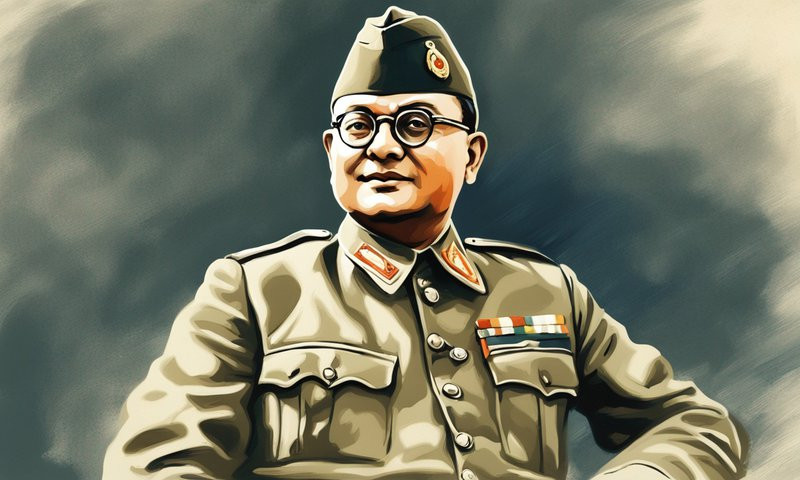Netaji Subhas Chandra Bose, a prominent figure in India’s struggle for independence, was a visionary leader and freedom fighter who dedicated his life to fighting against British colonial rule. Born on January 23, 1897, in Cuttack, Odisha, Netaji Bose played a significant role in shaping India’s history through his relentless pursuit of freedom and justice. Commemorate the birth anniversary of the iconic freedom fighter. Discuss his inspiring journey, military strategies, and legacy as a symbol of resistance against British rule.

Early Years in Bengal under British India
Growing up in a politically charged environment, Netaji Bose witnessed firsthand the injustices imposed by the British Raj. His early years were spent in Kolkata (then Calcutta), where he developed a deep sense of patriotism and an unwavering determination to free his country from colonial rule. Inspired by the teachings of Swami Vivekananda and Rabindranath Tagore, young Subhas Chandra Bose embarked on a journey that would shape the course of Indian history.
Taking the ICS Exam, Resignation, and Joining the Freedom Movement
Netaji Bose’s academic brilliance led him to qualify for the prestigious Indian Civil Service (ICS) exam. However, his strong sense of nationalism compelled him to resign from the coveted position in 1921. He joined Mahatma Gandhi and became an active participant in the Non-Cooperation Movement launched by the Indian National Congress (INC). His dedication to India’s freedom struggle earned him admiration and respect from fellow freedom fighters.
Differences with Indian National Congress Leaders
While Netaji Bose shared a common goal with other leaders of the Indian National Congress, he often found himself at odds with them regarding strategies and approaches. He believed that passive resistance alone would not be enough to achieve complete independence for India. This difference in ideology led him to part ways with the INC and seek alternative paths towards liberation.
Arrest and Escape to Europe
In 1940, during World War II, Netaji Bose was placed under house arrest by the British authorities. However, he saw this as an opportunity to escape and seek international support for India’s freedom struggle. In a daring move, he managed to evade his captors and journeyed to Germany via Afghanistan and Russia. This marked the beginning of a new chapter in his life, where he sought alliances with various nations to fight against British imperialism.
Formation of the Indian National Army
In 1942, Netaji Bose formed the Azad Hind Fauj (Indian National Army or INA) in Singapore with the aim of liberating India from British rule. The INA comprised both civilian volunteers and former prisoners of war from the Indian army who had been captured by Japanese forces. Under Netaji Bose’s leadership, the INA played a crucial role in fighting alongside Japanese forces against the British in Burma (now Myanmar) and Northeast India.
Contributions to the Freedom Movement
Netaji Bose’s contributions to India’s freedom movement were immense. He was a charismatic leader who inspired thousands of individuals to join him in his quest for independence. Through his speeches and writings, he promoted the idea of a united India free from any form of discrimination based on religion or caste. His vision for an inclusive and progressive nation continues to resonate with millions even today.
Suspected Death and Mystery Around His Disappearance
The circumstances surrounding Netaji Bose’s death remain shrouded in mystery and controversy. While it is widely believed that he died in a plane crash in Taipei on August 18, 1945, there are numerous theories challenging this account. Some speculate that he survived the crash and lived incognito for years after his supposed death. The mystery surrounding Netaji Bose’s disappearance has fueled countless investigations and debates over the years.
Key Takeaways
Netaji Subhas Chandra Bose’s life serves as an inspiration for generations to come. His unwavering dedication to the cause of Indian independence, his courage in the face of adversity, and his visionary leadership continue to inspire individuals around the world. His relentless pursuit of freedom and justice reminds us of the importance of standing up against oppression and fighting for what we believe in.
Links and References
To learn more about Netaji Subhas Chandra Bose and his contributions to India’s freedom struggle, you can explore the following resources:
- Netaji Subhas Chandra Bose: The Forgotten Hero
- Netaji Subhas Chandra Bose: The Untold Story
- Netaji Subhas Chandra Bose – Biography
Conclusion
Netaji Subhas Chandra Bose’s life was a testament to the indomitable spirit of India’s freedom fighters. His contributions to the nation’s struggle for independence continue to inspire generations. By celebrating his life and legacy, we honor not only a great leader but also the countless individuals who sacrificed their lives for a free India. Let us remember Netaji Bose as an embodiment of courage, resilience, and unwavering determination in the face of adversity.